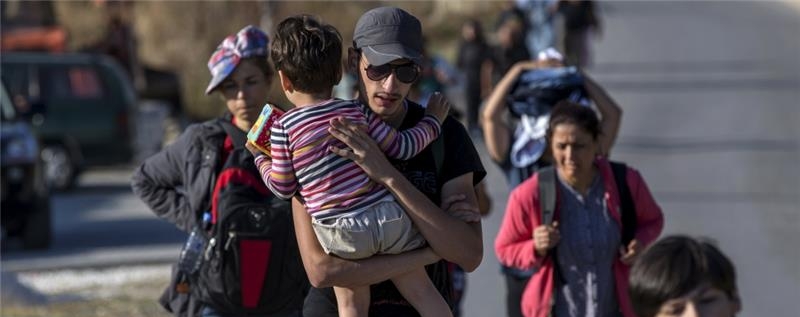Serbia: The challenges of respecting the rights of Roma, refugees and asylum seekers
Published on 30 Mar 2017, 08:44 AM
 The Committee was concerned about the treatment of refugees and asylum seekers arriving in Serbia. Photo credit: Al Jazeera
The Committee was concerned about the treatment of refugees and asylum seekers arriving in Serbia. Photo credit: Al Jazeera
The third periodic report of Serbia was reviewed by the Human Rights Committee on the 7th and 8th March 2017. The Human Rights Committee raised concerns such as the exclusion of Roma communities, the treatment of refugees and asylum seekers and the freedom of expression. Other issues were the slow progress in the investigations regarding missing persons from the wars in Yugoslavia and the persecution of war crimes.
Serbian NGOs from Human Rights House Belgrade attended the review with the support of Human Rights House Foundation. They provided information to the Committee on a wide range of issues and will closely monitor the implementation of the concluding observations by the Serbian State, in particular with regard to the observations that request an answer within a year.
The webcast of the review is available here: part 1 and part 2.
"There is a shrinking space for the debate about human rights and fundamental freedoms in Serbian society. Also, there is less and less public scrutiny of the Government that has a negative effect on the human rights situation in Serbia."
- Danilo Curcic from the Lawyers’ Committee for Human Rights (YUCOM)
Roma exclusion
The Committee asked to address discrimination against the Roma community. The delegation answered referring to the establishment of a body for the implementation of the Roma strategy. The number of Roma coordinators was increased in all targeted, including education and health. A public call was launched for public enterprises to include Roma. Regarding education, two rulebooks were launched: one on the criteria for the identification of discrimination and one on the inclusion of Roma in schools. Special schools are meant to prepare Roma children for enrolment in mainstream secondary schools. A housing law was adopted to regulate forced evictions of Roma.
Many questions remained unanswered, especially the issue of internally displaced Roma and their political underrepresentation.
Refugees and asylum seekers
Serbia is no longer a country of transit since it closed its borders. There is a significant backlog and migrants were returned to other countries without a proper hearing and the standard procedure. 18 000 people were prevented from entering into Serbia, but it is not clear whether their rights were respected. The Balkan route was closed in March 2016. The delegation emphasized that many migrants arrived from European Union Member States and intended to go to other Member States. At the moment, over 6,000 migrants were on the territory of Serbia, mostly from Iraq, Afghanistan, Pakistan and Syria. The Serbian Border Police applied all measures from the Schengen Catalogue, according to the delegation.
In the reception centers, persons are separated on the basis of needs instead of their legal status. In the future, asylum seekers would be separated from those refugees who want to continue their move into the EU. Outside the centers, the majority declines to go asylum centers because they believe that this will delay their departure to other countries.
Freedom of expression
The Committee expressed concern about the continuous concentration of media and the privatization that was not carried out. Another concern were the reports of physical attacks against journalists and instances of pressure. These incidents convey a message of a shrinking public space. This issue was thoroughly addressed by NGOs, members of Human Rights House Belgrade in their report of the session.
Recommendations of the Committee
The Concluding Observations for which the State should provide information on the implementation within one year, concern:
- Roma exclusion:
- Promote non-discriminatory access to opportunities and services in all fields for members of the Roma community
- Facilitate and enable registration of children born to parents without identification documents
- Allow internally displaced Roma to register their place of residence and to acquire identification documents
- Develop durable solutions with and for the Roma communities
- Implement the Strategy for the Social Inclusion of Roma
- Refugees and asylum seekers:
- Ensure that access to formal procedures for asylum applications is available at all border points and that persons engaging directly with refugees or migrants are appropriately trained
- Ensure that all applications are assessed promptly on an individual basis, respecting the principle of non-refoulement
- Refrain from collective expulsions and ensure an objective assessment of ‘safe third countries’
- Ensure adequate conditions in reception centers
- Ensure that appropriate age determining procedures are in place and that unaccompanied minors receive appropriate guardianship
- Freedom of expression:
- Provide effective protection to media workers from intimidation and ensure that all cases are investigated and perpetrators are punished
- Refrain from prosecuting journalists, human rights defenders and other civil society actors
- Ensure transparency of media ownership and that privatized media are free and independent
- Review the application of the Public Assembly Act to ensure its compatibility with the Covenant.
The next (fourth) periodic report of Serbia should be submitted by 29 March 2021.
 The Committee was concerned about the treatment of refugees and asylum seekers arriving in Serbia. Photo credit: Al Jazeera
The Committee was concerned about the treatment of refugees and asylum seekers arriving in Serbia. Photo credit: Al Jazeera

